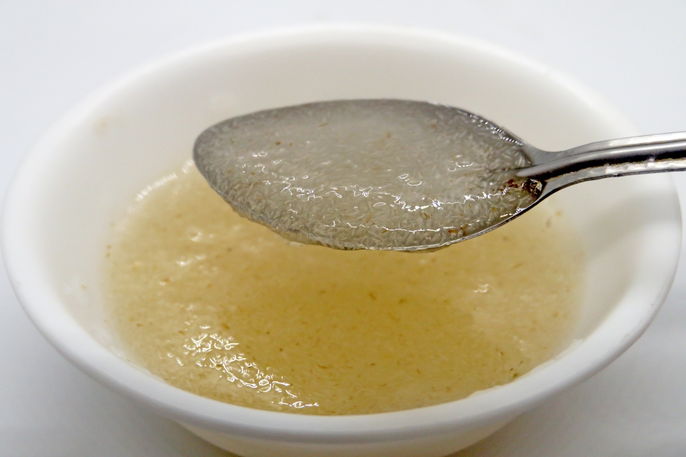Psyllium husk is a soluble fiber extracted from the shell of Plantago ovata seeds. It contains a laxative effect, which stimulates bowel movements and increases the bulk and moisture of stool to promote elimination.
Psyllium husk can be purchased at pharmacies in powder form to mix in water or other drinks. It is commonly known by the brand name, Metamucil. It can also be purchased in bulk, in 500 g packages for example.
It is important to take psyllium husk has guided by your doctor. Constipation should first be assessed before taking this supplement, as psyllium husk is contraindicated in cases of a bowel obstruction, chronic constipation or post-surgical constipation.

What it’s for
Psyllium husk can be taken for:
- Constipation
- Regulating bowel movements
- Promoting the formation and elimination of stool
Psyllium husk can also be used to decrease LDL cholesterol and sugar levels after eating, as the fibers in psyllium husk help to reabsorb the fat and sugars in food.
Can you take psyllium to lose weight?
Psyllium does not promote fat burning or stimulate more energy expenditure. However, as it is a fiber, it takes longer to digest and can therefore you keep you fuller for longer. This can reduce overall calorie intake during the day, which can promote weight loss.
However, the best way to lose weight in a healthy way is through a balanced diet, guided by a registered dietitian. You should opt for high fiber foods that are low in fat, sugar and calories. Read more about a weight loss diet and how to get started.
How to take
Powdered psyllium husk can be taken orally, dissolved in a 240 mL cup of any fluid, like water or fruit juice. Stir it gently to dissolve all of the powder, then drink it immediately after taking. You should ideally take psyllium with a meal. Do not swallow the powder without dissolving it in liquid, as it can cause choking. asphyxia and bowel obstruction.
Recommended psyllium doses vary according to age:
- Adults and children over 12: The recommended dose is one 7 g sachet or 1 teaspoon, mixed in 240 mL of fluids, 1 to 3 times per day.
- Children between 6 and 12 years old: The recommended dose is half of a 7 g sachet, or half a teaspoon (about 3.5 g), mixed in 240 mL of fluids, 1 to 3 times per day.
You should not take psyllium before going to bed, as this can interfere with bowel movements through the intestines. You should also increase your fluid intake when using psyllium husk to improve its action and prevent complications like a bowel obstruction.
Psyllium husk will usually have an effect 12 to 72 hours after taking a dose. Treatment should not last for longer than 7 days, unless otherwise indicated by a doctor.
For patients who take other medications, you should take psyllium 2 hours before or after taking them, to that the absorption and effects of these medications are not affected.
Also recommended: 35 High Fiber Foods: Food List, Health Benefits & Recommendations tuasaude.com/en/high-fiber-foodsPossible side effects
The most common side effects that can occur with psyllium treatment are excess gas, abdominal pain and bloating.
You are advised to discontinue psyllium use and to seek immediate medical attention if your constipation lasts for more than 7 days, or if you have symptoms like blood in the stool, nausea, vomiting and intense abdominal pain (which are signs of a bowel obstruction).
In addition, you should proceed to a hospital if you have symptoms of an allergy or anaphylactic shock, like difficulty breathing, throat swelling, or mouth, tongue or facial swelling.
Contraindications for use
Psyllium husk should not be taken by children under 6 years of age, or by people who have trouble swallowing. It is not indicated for people with a history of bowel obstruction, chronic constipation or post-surgical constipation.
In addition, psyllium husk should not be taken by people who are allergic to any of the components in its formula.
For diabetic, psyllium husk should only be used as oriented by a doctor, as it can decrease blood sugar levels, requiring adjustments to insulin and other related medications. Some psyllium husk formulations may also contain sugar, which is why it’s important for diabetics to speak to a doctor before taking.






























